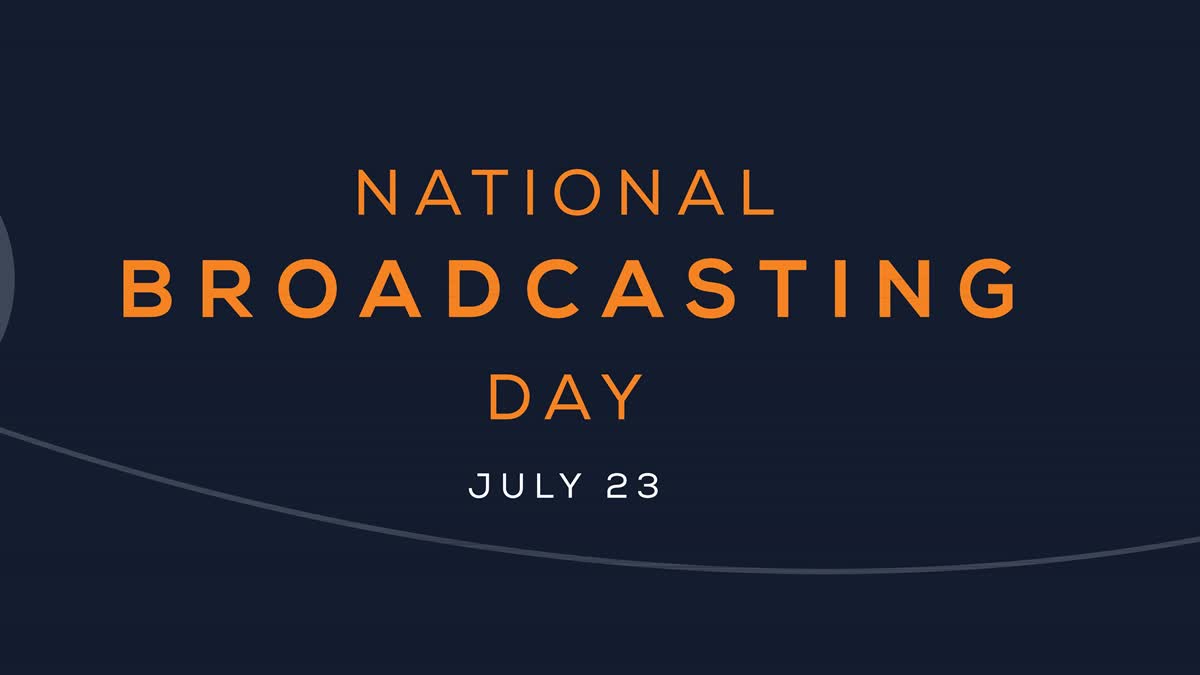Hyderabad: The broadcasting sector is a sunrise sector having huge potential to contribute towards the growth of the Indian economy. The industry is a vibrant, dynamic, and fast evolving sector that showcases India's technological expertise and rich cultural diversity. With the advent of digital revolution and advancements of technologies, the broadcasting sector has been phenomenal in attracting investments, fostering creativity and significantly elevating India’s image globally. The broadcasting sector is today the cultural ambassador of the country and has conferred a unique identity to India.
On July 23rd, India commemorates National Broadcasting Day to honor the profound influence of radio in our lives. This significant day marks the inception of India’s first-ever radio broadcast, known as “All India Radio (AIR).” To celebrate this occasion, All India Radio (AIR) organized a symposium in New Delhi focused on discussing the role of broadcasting in shaping a modern India and exploring new mediums of communication.
Today is National Broadcasting Day. On this day in 1927, the first ever radio broadcast in the country went on air from the Bombay Station under a private company, the Indian Broadcasting Company. On the 8th of June, 1936, the Indian State Broadcasting Service became All India Radio (AIR). The Central News Organisation (CNO) came into existence in August 1937. In the same year, AIR came under the Department of Communications and four years later came under the Department of Information and Broad.
National Broadcasting Day 2024 Theme
There is no specific theme on National Broadcasting Day 2024. But National Broadcasting Day 2024 celebrates the victory of India's broadcasting industry and recognizes the contributions of individuals who have contributed to its growth and success over the years. On this National Broadcasting Day 2024, different broadcasting channels and radio stations air special programs that showcase the history and evolution of the broadcasting industry in India. These events may involve interviews with prominent figures in the industry, panel discussions, and documentaries.
Significance of National Broadcasting Day
The meaning of National Broadcasting Day 2024 imprints the notable second when the nation’s very first radio station was made in 1927. On this day in 1927, the Indian Telecom Organization (IBC) made its most memorable transmission from Bombay. The IBC was a privately owned business, yet it was taken over by the public authority in 1930 and renamed All India Radio (AIR). National Broadcasting Day 2024 is an amazing chance to think about the significance of the right to speak freely of discourse and articulation and the force of mass correspondence in molding popular assessment and cultivating social and political change.
National Broadcasting Day History
National Broadcasting Day, celebrated on July 23rd, marks the inception of radio broadcasting in India. The history of this beautiful day dates back to 1927 when the Indian Broadcasting Company (IBC) made its first official broadcast from the Bombay Station.
This initial broadcast created a foundation for what would become an essential mode of communication in the country.
After the nationalisation of the Indian Broadcasting Company in 1930, All India Radio (AIR) was set up. AIR expanded the reach and influence of radio among the masses. AIR became an inseparable tool in India’s cultural and educational development, providing a platform for news, music and public service announcements.
Radio has played a crucial role throughout important moments in India’s history, including the independence movement and subsequent nation-building efforts, India’s lifting of the World Cup in 1983 and so on. National Broadcasting Day honours this rich legacy to celebrate the tremendous impact of radio broadcasting on Indian society and its consistent relevance in the digital age.
History ofRadio Broadcast in India
Radio broadcasting in India began during the British era in 1923 under the Bombay Presidency Radio Club.
It was later acquired by the government and renamed All India Radio in 1936 and Akashwani in 1957.
Radio broadcasting in India began as a private venture in 1923 and 1924 when three radio clubs were established in Bombay, Calcutta, and Madras (now Chennai).
In 1927, the Indian Broadcasting Company (IBC) became a private entity and was authorized to broadcast two radio stations.
On March 1, 1930, the Indian Broadcasting Company (IBS) was liquidated, and the government took charge of broadcasting facilities.
On April 1, 1930, the Indian State Broadcasting Service (ISBS) was formed on an experimental basis for two years.
On June 8, 1936, the Indian State Broadcasting Service (ISBS) became All India Radio (AIR).
When India was declared independent, the country had six radio stations across Delhi, Calcutta, Bombay, Lucknow, Madras, and Tiruchirapalli.
30 years later, FM broadcasting in India began on July 23, 1977, in Chennai.
AIR’s home service comprises of 470 Broadcasting centres located across the country, covering nearly 92% of the country’s area and 99.19 % of the total population. Terrestrially, AIR originates programming in 23 languages and 179 dialects.
India's radio broadcast history goes back to the early 1920s.
During British rule, the first radio program was broadcast in July 1923 by the Radio Club of Mumbai. Four months later, Calcutta Radio Club also went on air.
The private Indian Broadcasting Company Ltd. (IBC) came into existence in July 1927, when it started functioning with two radio stations in Mumbai and Calcutta.
